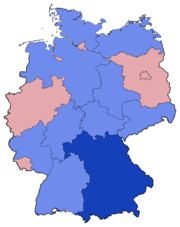German federal election, 1994
|
|
||||||||||||||||||||||||||||||||||||||||||||||||||||||||||||||||||||||||||||||||||
|---|---|---|---|---|---|---|---|---|---|---|---|---|---|---|---|---|---|---|---|---|---|---|---|---|---|---|---|---|---|---|---|---|---|---|---|---|---|---|---|---|---|---|---|---|---|---|---|---|---|---|---|---|---|---|---|---|---|---|---|---|---|---|---|---|---|---|---|---|---|---|---|---|---|---|---|---|---|---|---|---|---|---|
|
||||||||||||||||||||||||||||||||||||||||||||||||||||||||||||||||||||||||||||||||||
|
All 672 seats in the Bundestag 337 seats were needed for a majority |
||||||||||||||||||||||||||||||||||||||||||||||||||||||||||||||||||||||||||||||||||
| Turnout | 79.0% (voting eligible) | |||||||||||||||||||||||||||||||||||||||||||||||||||||||||||||||||||||||||||||||||
|
||||||||||||||||||||||||||||||||||||||||||||||||||||||||||||||||||||||||||||||||||

Party list election results by state: dark blue denotes states where CSU had the absolute majority of the votes; lighter blue denotes states where CDU had the plurality of votes; and pink denotes states where the SPD had the plurality of votes
|
||||||||||||||||||||||||||||||||||||||||||||||||||||||||||||||||||||||||||||||||||
|
||||||||||||||||||||||||||||||||||||||||||||||||||||||||||||||||||||||||||||||||||
German federal elections took place on 16 October 1994, to elect members to the 13th Bundestag (parliament) of the Federal Republic of Germany.
The SPD let its members elect a candidate for Chancellor against Helmut Kohl. Rudolf Scharping, Minister-President of Rhineland-Palatinate, beat Gerhard Schröder and Heidemarie Wieczorek-Zeul in the SPD's internal election. Tension between Scharping and other SPD leaders such as Oskar Lafontaine and Gerhard Schröder hampered his campaign.
For the first time the Green party seemed to be willing to actually join a government in the event that a SPD – Green coalition had the majority.
The coalition between the CDU/CSU and the FDP was able to continue in power with Helmut Kohl as chancellor.
The PDS won four constituency seats in its power base of the former East Berlin, qualifying it for proportional representation seats even though the party failed to cross the 5% electoral threshold. Under a longstanding electoral law intended to benefit regional parties, any party that won at least three constituency seats was entitled to its share of proportionally-elected seats regardless of vote share.
...
Wikipedia





